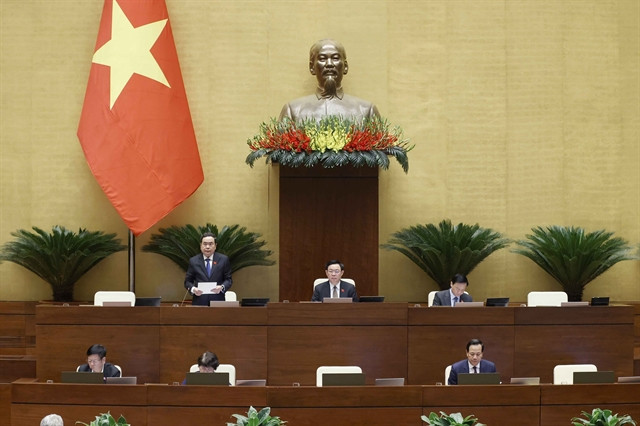 |
| National Assembly’s Vice Chairman Trần Thanh Mẫn (standing) chairs the session. — VNA/VNS Photo Doãn Tấn |
Limiting the number of workers taking lump-sum social insurance withdrawal, while ensuring their stable lives received close attention from National Assembly (NA) deputies when the NA discussed the amended Law on Social Insurance on Thursday morning.
Deputy Sùng A Lềnh, from Lào Cai northern mountainous province, said that to cut down the number of people receiving lump-sum social insurance withdrawal, which increased yearly, careful analysis was necessary to determine the fundamental causes, then devise solutions and a uniform policy for the issue.
Emphasising that one-time social insurance withdrawal was a legitimate interest of workers, deputy Đoàn Thị Thanh Mai, from Hưng Yên northern province, still said that it was a worrying reality for the goals of social security for the entire population.
She analysed the advantages and disadvantages of the two plans submitted by the drafting committee and preferred the option that employees could choose to withdraw social insurance all at once or 50 per cent of the paid period.
Deputy Nguyễn Thị Tuyết Nga, from Quảng Bình central province, also said that a comprehensive solution was needed to protect workers and prevent them from wanting to withdraw insurance all at once.
She suggested strictly regulating the conditions for one-time social insurance withdrawal. The law can consider designing different options for workers to choose.
Deputy Phạm Thị Kiều, from Đắk Nông Central Highlands province, wanted to establish a loan fund for workers who stop working but are not eligible for pensions, whereas deputy Nguyễn Thanh Cầm, from the southern province of Tiền Giang, recommended that the drafting committee should collect opinions from those directly affected, considering the gender perspective, to come up with a thorough and responsive plan.
The plan must meet the substantive rights and aspirations of employees to receive one-time social insurance.
She supports the plan that workers can withdraw social insurance all at one time in the most satisfactory way. In addition, different supportive forms should be given to workers such as preferential loan credit, education to change their awareness and behaviour to help them recognise the long-term benefits of social insurance, thereby voluntarily committing to join.
Payment delay
Reviewing and supplementing solutions to prevent delays and evasion of social insurance payments also received the attention of the NA deputies.
Deputy Đỗ Thị Việt Hà, from Bắc Giang northern province, said there were many reasons for this situation, including the lack of strict management on people buying compulsory social insurance.
Solutions to handle the issue have not been as effective as expected.
To ensure the law’s strictness, Hà proposed the drafting committee to research and supplement measures and sanctions such as taking social insurance from the debtors’ bank accounts after notifying them, or publicising the debtors’ identities on mass media.
She suggested having uniform and feasible regulations to fix the current difficulties and obstacles in conducting civil lawsuits and criminal prosecutions against employers with slow payment or who evade social insurance payments.
Specifically, Clauses 4 and 5, Article 37 should be supplemented that when the employers have acts of delayed or evading social insurance payment, the competent authority gave them administrative punishment but they still ignored, not only the social insurance agency, but also the trade union and workers have the rights to sue the employers.
Hà wanted to improve concerned legal regulations to ensure the feasibility and effectiveness of suing and prosecuting people with delayed evaded compulsory social insurance payments.
Deputy Mai from Hưng Yên Province analysed that adding people buying compulsory social insurance aimed at gradually expanding the coverage of compulsory social insurance, but would lead to additional costs for both employees and employers.
Therefore, it is necessary to carefully research and evaluate the impacts and clarify the costs and benefits of compulsory social insurance for these groups to avoid negative impacts. — VNS